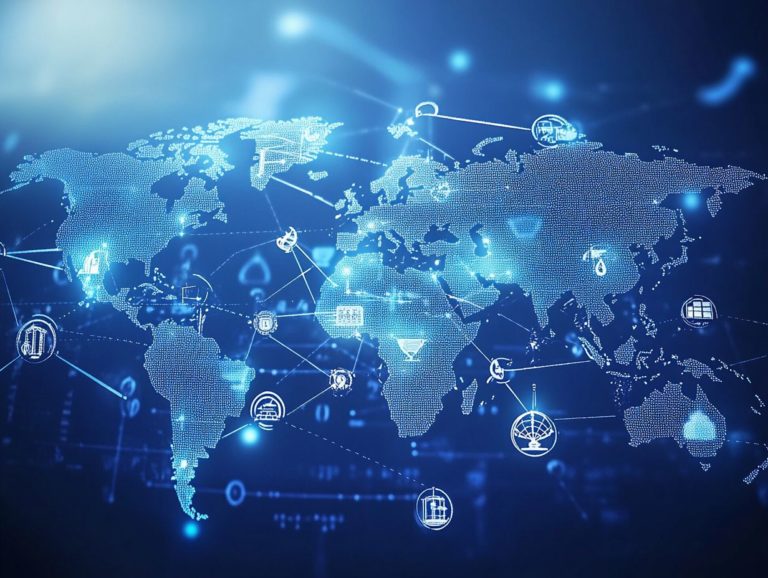International IP Law and the Digital Economy
In today s rapidly evolving digital economy, the landscape of international intellectual property (IP) law is more critical than ever for you. This article delves into the definition and purpose of IP law, examining how it adapts to the challenges and opportunities presented by digital advancements.
You ll discover the key players and organizations shaping this field, along with pressing issues such as copyright protection and piracy. Finally, we ll explore the future of IP law in a data-driven world.
Join in as you navigate these complex yet fascinating intersections.
Contents
- Key Takeaways:
- Overview of International IP Law
- Impact of the Digital Economy on IP Law
- Key Players in International IP Law
- Current Issues in International IP Law and the Digital Economy
- Future of International IP Law and the Digital Economy
- Frequently Asked Questions
- What is International IP Law and how does it relate to the Digital Economy?
- What are some common types of IP protected under International IP Law in the Digital Economy?
- How does International IP Law help promote innovation and economic growth in the Digital Economy?
- What challenges does International IP Law face in the context of the Digital Economy?
- What are some recent developments in International IP Law and the Digital Economy?
- How can businesses and individuals ensure compliance with International IP Law in the Digital Economy?
Key Takeaways:

International IP law protects intellectual property rights across borders, promoting innovation and creativity in the digital economy. The digital economy brings challenges and opportunities for IP law, such as copyright infringement and data privacy concerns. Understanding the latest trends and developments in international IP law is essential, as key players and agreements play a crucial role in shaping the future of IP protection in the digital age.
Overview of International IP Law
International IP law presents a comprehensive framework carefully designed to safeguard intellectual property (IP) rights across borders. This ensures that creators and businesses like yours can effectively secure their innovations and artistic endeavors in an increasingly interconnected global marketplace.
This legal structure is essential for nurturing economic growth and stimulating innovation. It is especially important as digital transformation reshapes business models in dynamic regions like Singapore and beyond.
It encompasses various aspects of IP such as copyright, trademark, patent, and trade secret protection all of which play a crucial role in sustaining fair competition within the digital economy.
Definition and Purpose
The essence of international IP law centers on legal frameworks designed to protect creators and innovators. This ensures that their intellectual property rights are acknowledged and enforced across various jurisdictions.
This legal foundation serves several crucial purposes. It protects individuals and companies that invest time and resources into developing unique ideas, products, or content.
By establishing a secure environment for innovation, international IP law gives you the power to take risks and explore the edges of creativity, knowing your efforts can be legally defended.
These protections nurture economic growth globally by fostering fair competition. They also promote trade especially in the digital economy, where the ease of copying and distribution can threaten original creators.
Understanding these laws safeguards your innovations and unlocks opportunities for collaboration and expansion, ultimately benefiting the economy as a whole.
Impact of the Digital Economy on IP Law
The digital economy is reshaping the realm of international IP law, presenting a unique blend of challenges and extraordinary opportunities for businesses like yours. To understand these changes better, explore the future of international IP law.
As you adapt to the fast-paced technological advancements, including artificial intelligence and online platforms, it’s essential to reassess your existing IP protection strategies. This evolution demands a proactive approach to mitigate risks such as data theft and trademark infringement.
For companies in Singapore and beyond, grasping the implications of the digital economy on IP law is vital for securing and protecting your innovations in this dynamic landscape.
Challenges and Opportunities
The clash of the digital economy with international IP law brings exciting challenges and amazing opportunities your business can seize! As technology evolves at a breakneck pace, understanding the interplay between trade law and IP law becomes essential to navigate an increasingly complex legal landscape that struggles to keep up with groundbreaking innovations like artificial intelligence and blockchain.
The rise of online marketplaces complicates traditional notions of copyright, compelling you to rethink your protection strategies. In this dynamic environment, creativity thrives, prompting you to adopt unique approaches for safeguarding your intellectual property while leveraging new digital platforms.
This adaptability empowers your brand to maintain a competitive edge. It cultivates an atmosphere ripe for inventive solutions that redefine IP management in an ever-changing landscape.
Key Players in International IP Law

Key players in international IP law include various organizations, treaties, and governmental bodies. They work together to set standards, enforce rights, and advance effective IP protection worldwide.
In places like Singapore, the ASEAN Patent Examination Cooperation and the Intellectual Property Office of Singapore (IPOS) play important roles. These entities shape IP laws and help trade and economic growth while addressing complex cross-border IP issues.
Organizations and Agreements
Organizations and agreements, such as the PCT-Patent Prosecution Highway, foster international cooperation in intellectual property. They ensure that IP rights are harmonized and effectively enforced across different countries.
As your business ventures into the global market, this collaboration is essential. Navigating legal landscapes and cultural contexts makes partnerships invaluable.
Notable treaties like the Berne Convention and the TRIPS Agreement provide vital guidelines for copyright and trademark protection globally. They establish minimum standards for IP rights while enhancing the sharing of innovations and creative works.
By streamlining processes like patent applications and dispute resolution, these organizations allow you to focus more on innovation. This focus can boost your competitive edge in a globalized market.
Current Issues in International IP Law and the Digital Economy
Current issues in international IP law, especially in the digital economy, focus on copyright protection and the fight against counterfeit goods and piracy. Understanding the challenges of IP law in the age of globalization is crucial, as strong IP frameworks are necessary to ensure your innovations and creative works are protected.
Copyright Protection
Copyright protection is crucial in the digital economy. It safeguards your digital assets and creative works from unauthorized use across online platforms.
As you navigate an environment where your IP can be copied easily, this protection becomes critical. The challenges are significant, from rapid content dissemination to tracking unauthorized use, leading to potential financial losses.
To strengthen enforcement, you and your organization should adopt proactive measures such as:
- Using digital watermarking
- Employing robust monitoring tools
- Educating yourself about your rights
Collaborating with legal experts can provide tailored strategies to assert your rights and protect the value of your creativity.
Counterfeit Goods and Piracy
The rise of counterfeit goods and piracy in the digital economy is a significant challenge to IP law. It undermines the rights of legitimate businesses and delivers substantial economic repercussions.
When IP rights erode, innovation suffers. Creators and entrepreneurs may hesitate to invest in new ideas due to the threat of imitation.
To combat these challenges, various measures are underway. Stricter enforcement of IP laws, tougher penalties for offenders, and public awareness campaigns are part of the strategy.
International cooperation is vital, as counterfeit goods often cross borders. Countries must collaborate to establish uniform standards and share intelligence on piracy trends.
Through these efforts, nations are strengthening defenses against pressing issues, striving to protect both creators and consumers alike.
Data Privacy and Security

Data privacy and security are paramount concerns for you in the realm of international IP law. This is especially important as your business increasingly operates in the digital economy, where sensitive information is at risk.
In this rapidly evolving landscape, you need to quickly navigate a complex web of regulations designed to protect trade secrets and consumer data alike. The rise of cyber threats makes it essential for you to implement robust cybersecurity measures. These measures should not only safeguard your intellectual property but also comply with various legal frameworks, such as the General Data Protection Regulation (GDPR) and the California Consumer Privacy Act (CCPA).
By adopting best practices like regular security audits, employee training, and strong encryption protocols, you can significantly reduce the likelihood of data breaches. This ensures that your innovations and proprietary information remain secure.
Future of International IP Law and the Digital Economy
The future of international IP law is on the brink of transformation, profoundly shaped by the rapid evolution of technology and the impact of digital technology on international IP law.
As you navigate this shifting landscape, you’ll find that businesses and policymakers are adapting to new realities and challenges. Technologies like artificial intelligence and blockchain are redefining the parameters of IP rights. This creates an urgent need for innovative legal frameworks that can effectively safeguard intellectual property in this emerging era.
Countries such as Singapore are leading the charge, developing sophisticated IP strategies that set a benchmark for others to follow.
Predictions and Trends
Predictions about the future of international IP law and the digital economy indicate that you’ll need to place greater emphasis on adapting to technology. Establishing flexible laws will be crucial to tackling evolving challenges.
As innovations like artificial intelligence and blockchain continue to upend traditional models, it’s clear that you’ll need to reevaluate existing laws. Both legal practitioners and businesses must stay ahead of the curve, ensuring compliance with emerging regulations while diligently safeguarding their intellectual property rights.
The rise of digital platforms complicates ownership issues. It’s essential for you to adopt flexible strategies that can evolve in real time.
In this landscape, adaptability will not only serve as a competitive advantage but also become a fundamental requirement for survival in the increasingly intricate world of digital commerce.
Frequently Asked Questions
What is International IP Law and how does it relate to the Digital Economy?
International IP Law is a set of rules and regulations that govern the protection and enforcement of intellectual property (IP) rights on a global scale. IP refers to the creations of the mind, like inventions, designs, and brands, that are legally protected. With the growing importance of the digital economy, these laws have become crucial in protecting online resources such as software, content, and digital technologies.
What are some common types of IP protected under International IP Law in the Digital Economy?

Some common types of IP protected under International IP Law in the Digital Economy include patents, trademarks, copyrights, and trade secrets. Understanding the future of IP strategy in the digital age is crucial, as these forms of protection help safeguard online resources and encourage innovation and creativity in the digital space.
How does International IP Law help promote innovation and economic growth in the Digital Economy?
International IP Law provides a framework for protecting and enforcing IP rights. This encouragement leads businesses and individuals to invest in research and development, resulting in new and innovative products and services. For insights on future developments, check out International IP Law: What’s Next?. This, in turn, promotes economic growth and fosters a competitive market in the digital economy.
What challenges does International IP Law face in the context of the Digital Economy?
One of the main challenges faced by International IP Law in the digital economy is the speed at which technology evolves. This rapid change makes it difficult for laws and regulations to keep up and adapt to new forms of digital innovation. Understanding the role of technology in shaping international IP law is crucial, as the global nature of the digital economy also makes it challenging to enforce IP rights across different jurisdictions.
What are some recent developments in International IP Law and the Digital Economy?
In recent years, there’s been a strong focus on international agreements to tackle challenges in protecting intellectual property (IP) in the digital economy, particularly regarding the impact of AI on international IP law.
The World Intellectual Property Organization (WIPO) created the WIPO Copyright Treaty and the WIPO Performances and Phonograms Treaty to enhance IP rights in the digital age.
How can businesses and individuals ensure compliance with International IP Law in the Digital Economy?
To stay compliant, businesses and individuals must keep informed about current laws and regulations.
They should also create policies to protect their own IP rights while respecting the rights of others online.
Learn more about your rights and responsibilities in the digital economy!






